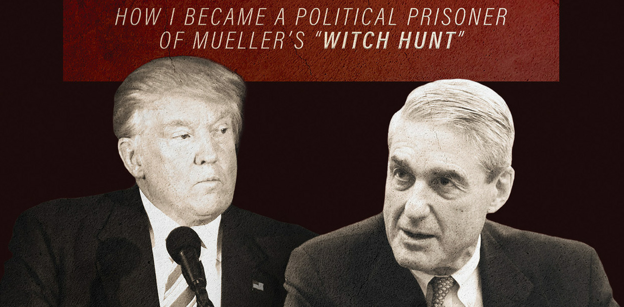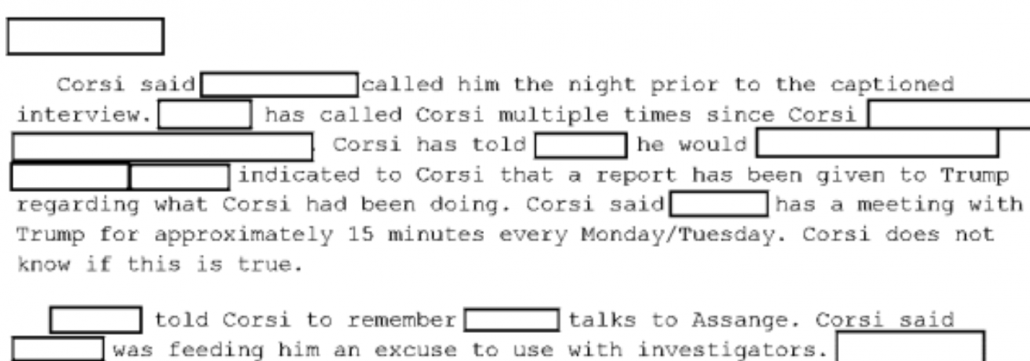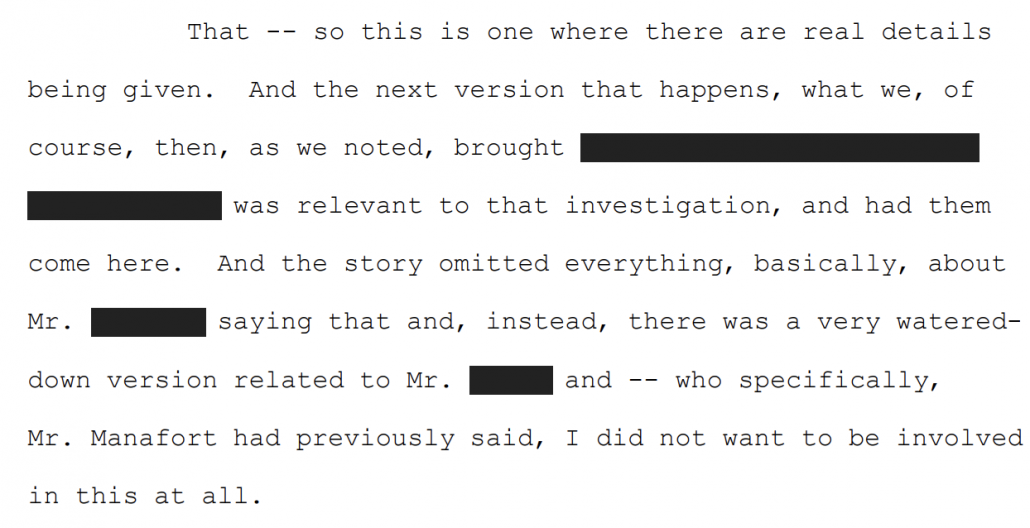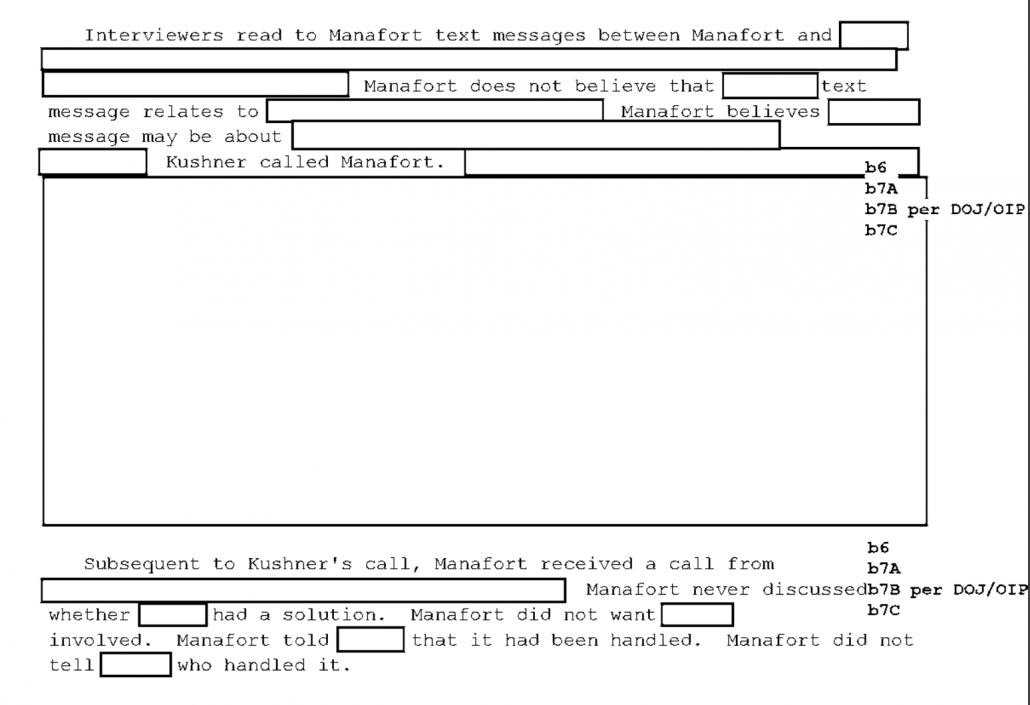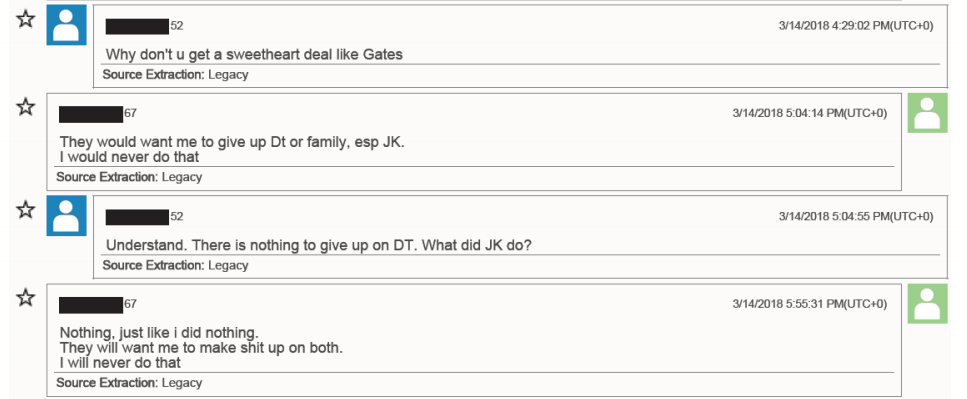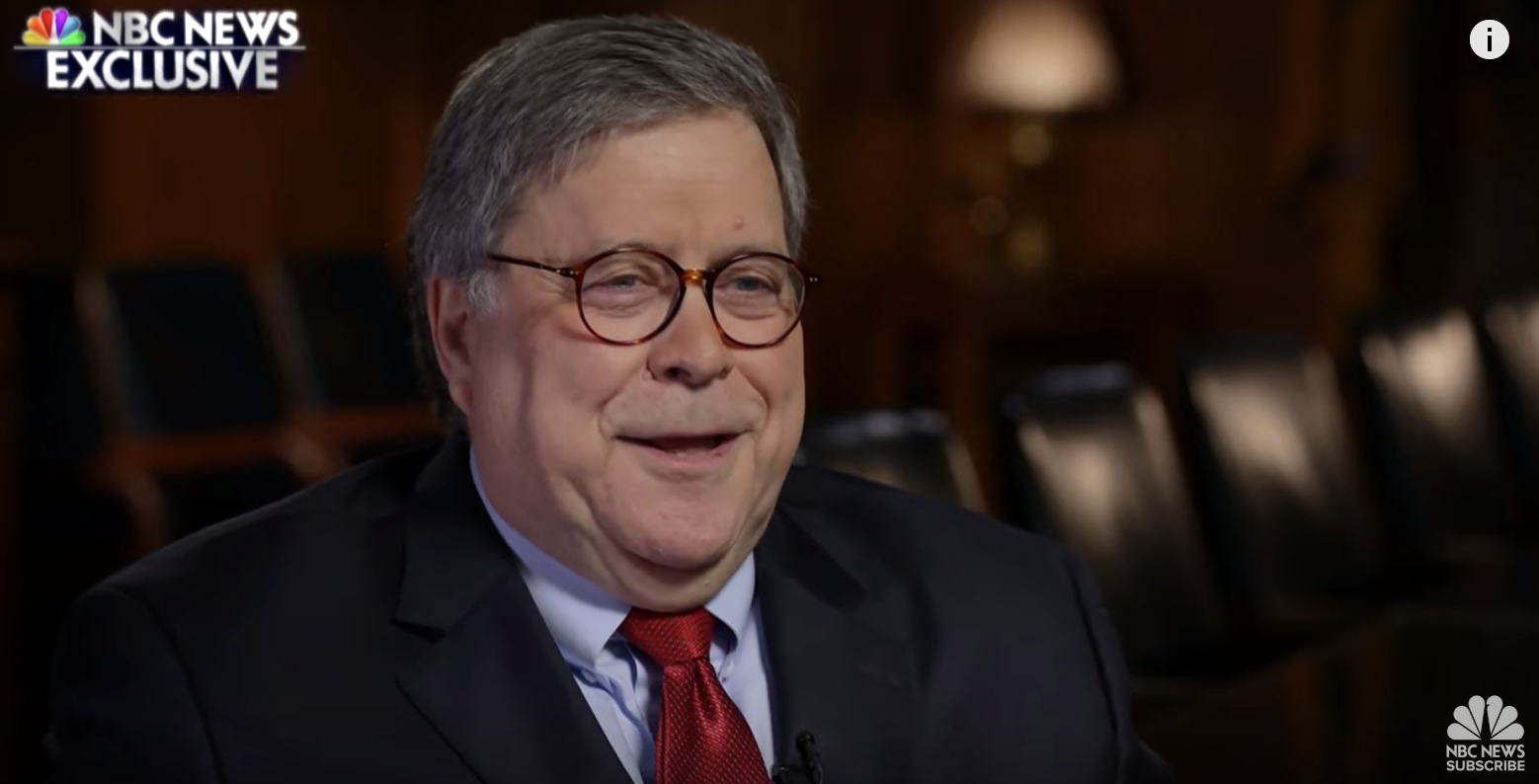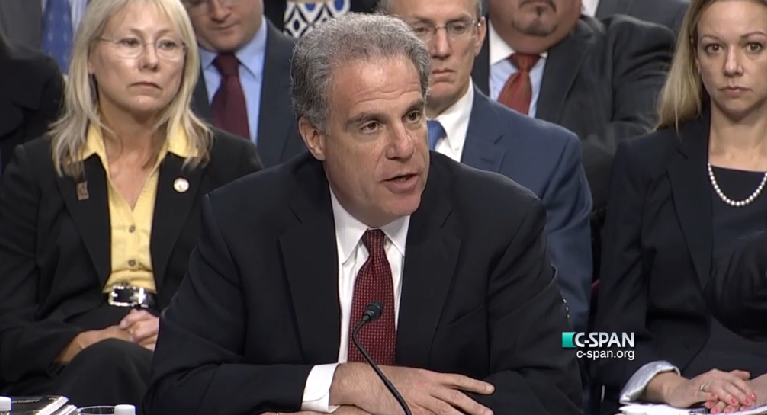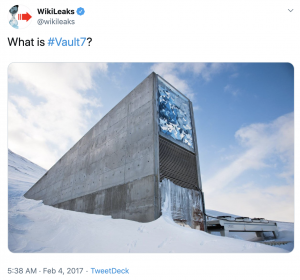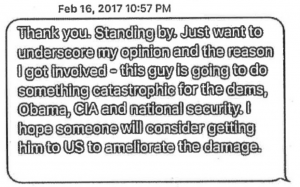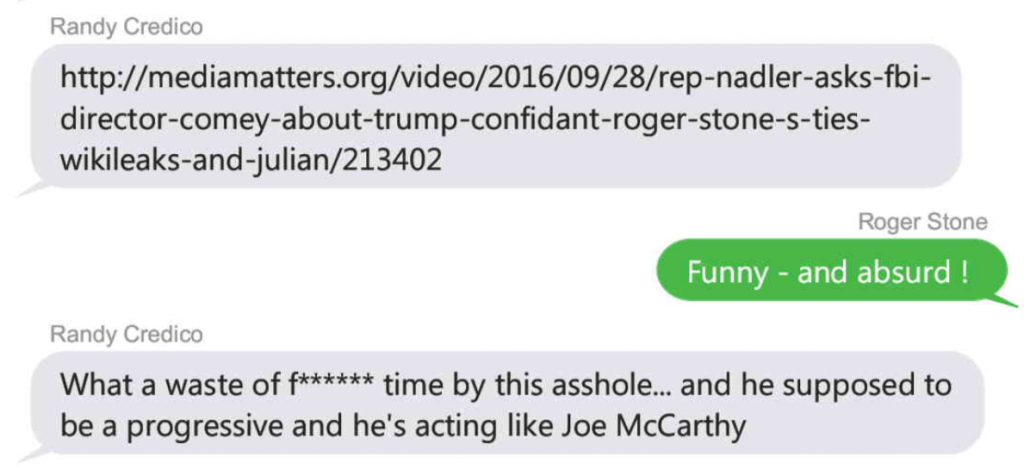Jerome Corsi’s Descent into Madness
Among the Mueller documents released to BuzzFeed under FOIA the other day are five of Jerome Corsi’s six interview reports (called 302s). Two 302s from Ted Malloch were released as well. I suspect these were released now so that they could be released after Roger Stone’s trial, but before the gag order Amy Berman Jackson imposed is lifted when Stone is sentenced next month, meaning it was a convenient way to hide information behind b7ABC redactions for an ongoing investigation.
While some are heavily (and in one case, entirely) redacted, the reports read in conjunction with Corsi’s book provide a glimpse of what Mueller’s team was focused on in 2018 as they tried to finalize charges against Roger Stone.
Corsi’s “cooperation” can be broken into three periods. From September 6 to 21, Mueller’s team got Corsi to stop lying about his role in Roger Stone’s attempt to learn about WikiLeaks’ releases and testify to the grand jury that a report he did on August 31, 2016 was a cover story Stone asked him to write on August 30. From then until November 2, Mueller’s team unsuccessfully tried to get Corsi to tell them his (or Stone’s) source of information about WikiLeaks’ drops. In response, they tried to use false statements charges to get him to cooperate, but after the election, Jeff Sessions’ replacement with Big Dick Toilet Salesman Matt Whitaker, and some intervention from Trump, Corsi refused to cooperate on November 26.
While there’s a ton that’s still redacted, it seems that Corsi revealed a lot of details about how he and Stone tried to cover up what they were doing in August 2016, but not the stuff they were trying to cover up. Which may be why the government charged Stone just for that cover-up.
Corsi’s claims about joint defense agreements
In his book, Corsi provides an illogical explanation for why he purported was comparing notes with Trump’s lawyers, but not Stone’s.
September 5, 2018: He immediately precedes the description of his first trip to DC to meet with Mueller’s team with an explanation that Jay Sekulow had reached out to his lawyer, David Gray, to offer to enter into a Joint Defense Agreement. Contextually, Gray’s call to accept Sekulow’s offer may have been placed the night before they went to DC.
September 6: First interview (Zelinsky, Goldstein, Rhee)
In the first interview, Corsi attempted to (and publicly said in advance he would) testify that Stone had asked him to break the law, but he had not done what Stone requested. After going through background about how Corsi met Trump, some people on his campaign, and Stone, Aaron Zelinsky made it clear that they had proof Corsi had done what Stone requested. That led Gray to ask prosecutors excuse Corsi’s false testimony because he didn’t have his emails, so hadn’t been able to review what really happened. After Gray offered to have Corsi restore his emails and review what really did happen, they broke for the day.
The unredacted parts of the 302 contradict Corsi’s claims about two topics: how many FBI Agents were in his interview (the 302 appears to show just two) and who started a discussion about recording the interview. According to the 302, Corsi’s lawyer did — and asked to record the interview himself, which led Mueller’s team to ask whether he or Corsi were taping the interview and whether they had recorded their conversations with the FBI Agent who had picked them up. After this discussion in the 302, there’s a long redaction that may pertain to the terms on which Corsi shared his devices.
Much of the unredacted interview includes Corsi’s background, including how he came to move from WorldNetDaily to InfoWars, though this passage redacts Stone’s name for ongoing investigation reasons.
The unredacted passage describes Corsi’s description of visiting Trump campaign headquarters in June. He does not, at least in the unredacted passages, reveal something that he revealed in his book: that he met Trump there, who said, “That’s trouble there.” The 302 includes a detail that isn’t in his book though: that he had extensive interactions with Michael Cohen, who “relayed messages to Trump” for him.
The 302 redacts Corsi’s description of how he came to know Stone, and his claims about what happened in July and August 2016.
Which leads to this description of interacting with Sam Clovis about Ted Malloch.
Around the same time, Corsi told Sam Clovis about Malloch. Clovis was being ignored by the campaign and his foreign policy team was failing. Corsi never met with Clovis in person, but Clovis knew of Corsi’s work.
In his book, Corsi provides a version of something that’s totally redacted (for ongoing investigations) in the 302: how he claimed he did not respond to Stone’s request to try to find out what Julian Assange had.
“As I result of that experience, I told Stone, ‘No,’ that I would not contact Assange or ask anyone to get in touch with Assange,” I explained. “I knew that from the moment I contacted Julian Assange, I would be under investigation from several different intelligence agencies, including those of the U.S. government.” Besides, I asserted to Mueller’s team, even if Assange had told me what Democratic National Committee emails he had and what he planned to do with them, no one would believe me. I argued that I had decided to wait until Assange published the emails. Then, I could write about the stolen emails without being involved in an investigation.
In response to this lie, Zelinsky told Corsi they had proof that he did actually respond (which was an email he forwarded to Ted Malloch on July 25).
The 302 includes (but redacts) some things Corsi said to the FBI Agent who drove him back to his hotel; he said he asked them for help figuring out what proof Zelinsky had that he had actually responded.
In Corsi’s book, he explains how the night after he testified, one of Stone’s lawyers called David Gray. Corsi describes the dilemma he faced about whether to respond (which, he claimed, he worried would leak) or not to (which, he worried, would make Stone think he flipped on him). Ultimately they claim they told Stone’s lawyer, “We decline, for now,” to tell him what happened. Even assuming this is true, Corsi doesn’t reveal whether they later did tell Stone what was going on in his interviews. Effectively Corsi would like you to believe he had no problem sharing notes with Trump but he thought it would be a problem to share them with Stone.
The day after his interview, Agents return his devices, and he describes restoring his emails from 2016. He describes “discovering” the July 25 email (but not, allegedly, the August 2 one or an August 15 one that clearly pertains to WikiLeaks files, nor an August 16 one to Ted Malloch discussing Putin). He also “discovers” an August 15 story he wrote about Stone.
Note: it’s bullshit that he didn’t have the July 25 and August 2 emails. On April 3, 2017, Stone lawyer Grant Smith had sent Corsi what he claimed were the only two emails discussing a request between them.
This got sent while Corsi and Stone were further elaborating on his cover story, so might have been interpreted as a code not to mention Corsi’s response or an August 15 email from him reflecting further knowledge of what emails would drop.
September 17: Second interview (Zelinsky, Rhee, Goldstein)
In any case, at the beginning of the next interview on September 17, per Corsi’s book, Zelinsky told Grey they have specific knowledge that Corsi predicted the Podesta emails and had some effect over their release in October.
In this interview, per his book, Corsi admits he told Stone that the Podesta emails were coming, but claimed not to know who told him about them. The unredacted parts of the 302 seem to show some of what explanation he gave, including his ties to Ted Malloch. The 302 shows Corsi admitting he spoke with Malloch (on Facetime), did not recall Malloch ever providing information from Assange.
The 302 describes Corsi claiming, “[M]any people were interested in Corsi getting in touch with Assange.” That’s probably true, as his WND editor wanted him to interview Assange. But I wonder if it reflects speaking to Trump about it.
Corsi also explained that he had additional ties to the Trump campaign, via Kellyanne Conway and Stephen Miller, the latter of whom is particularly interesting, given his ties to white supremacist culture.
The 302 redacts all of Corsi’s bullshit claims not to know who told him about the Podesta emails.
September 21: Third interview (Zelinsky, Rhee, Goldstein), proffer signed
Corsi’s third interview took place at the DC Courthouse, just before he testified for half an hour before the grand jury. Over the course of the interview, his lawyer asked for a proffer to protect Corsi for being charged with suborning perjury for writing part of Stone’s cover story.
The interview started with Corsi repeating his bullshit story about telling Stone that Podesta’s emails were coming (which is redacted in the 302), but claiming that he didn’t know his own source for that information.
Corsi said, as of August 2016, he had watched and seen Podesta for a long time. Corsi thought WikiLeaks would release Podesta’s emails serially in order to continually feed the news cycle, as opposed to dropping all the information at once. Corsi also thought Julian Assange (Assange) would designed the release of Podesta’s emails to be an “October surprise.”
After that the interview turned to Corsi’s claims in an email (which Mueller was never able to determine the truth of) to have been responsible for WikiLeaks releasing the Podesta emails to stomp on the Access Hollywood video. In this interview, he stated he had no input over that release.
The 302 redacts the discussion of the cover story Corsi helped craft on August 30, but shows the process of Mueller’s team verbally and then later writing up a proffer protecting Corsi from any criminal exposure for doing that.
10:50 AM: SCO enters into a verbal proffer (Corsi’s lawyer realizing his client was at risk for cover-up)
Corsi’s discussion of Ted Malloch is totally redacted (Corsi told Malloch in August that he knew the Podesta emails were coming).
There’s a partly redacted discussion of Corsi’s relationship to someone whose name is redacted. It likely relates to Brexit (because it mentions the EU), and it appears someone offered Corsi a job, which Corsi claims felt like a con-job.
Then interview moves to someone Russian he knows (redacted with b7A but not B, suggesting it was counterintelligence). That discussion appears before the 302 notes that, “Corsi said many people contact him and he doesn’t always know who they are.”
Some of the discussion about October 7, the Podesta email release, is redacted. But there’s a great deal of bullshit claims about how Corsi got the emails released via the strength of his own tweeting.
Corsi was convinced, however, it was through his efforts that WikiLeaks released Podesta’s emails when they did.
Finally, this passage is likely a reference to Stone trying to coach Corsi’s testimony, though the redacted name is likely not Stone’s (because it’s not redacted for b7ABC). Given that one of Stone’s lawyers called him on September 6, it seems likely it was one of the lawyers (possibly Grant Smith by length and his seeming role in Stone’s cover stories). Note he may be trying to move Corsi back to the Credico cover story.
This passage — and the references to Trump getting reports on his testimony — is all the more weird given that his lawyer probably was in close contact with Sekulow during this process (Sekulow doesn’t seem to fit based on length).
After Corsi gave testimony about the August 30 cover story to the grand jury, Mueller’s team told him he might be called back to talk more about his source.
October 22: In the middle of this process, I wrote a post arguing that Stone and Corsi appeared to have not just gotten news of Podesta’s emails, but got the actual emails in advance. I’m sure Mueller’s team had far more evidence to get there on their own, but I find this post worth marking.
October 25: Before they brought Corsi back again, they interviewed Rick Gates on WikiLeaks stuff, including asking why he got sent Corsi stuff. (PDF 39)
October 29: The FBI finished the first batch of Corsi’s 302s, from September 6, 17, and 21, on October 29, also before he was called back.
October 31: Proffer continued.
DOJ did not release the October 31 Corsi 302 (though it’s supposedly going to come out in a January 17 production). Corsi’s book discusses his testimony from October 31, November 1, and November 2 all in one bunch. But it seems clear that on October 31, the prosecutors showed him more records showing that he was lying about his source for Podesta.
November 1 (Rhee, Goldstein, Zelinsky, Atkinson for some of the interview): Proffer continued
This is the one interview where Rush Atkinson showed up for parts of the interview, which is interesting given that he worked on the Russian side of the investigation.
The interview starts with Corsi shifting his story yet again, claiming he did not remember a lot of what he was shown the day before, so he “realized that the way he wanted to remember things was not actually how things happened.” The interview discusses a bunch of redacted stuff, then again Corsi admitted he, “had been lying to himself to believe his own cover story.”
The discussion then turns to Ted Malloch, interspersed with discussions about WND. He clearly invents another story about how he learned about Podesta’s emails (which Corsi lays out in his book). After more redacted material, the 302 reveals that, rather than (or in addition to) asking Assange about Bernie’s brother on August 16, 2016 — a request Stone had made of him in July — he also mentioned Putin. (!!!)
Corsi did not remember sending Malloch an email on August 16, 2016 about Putin.
This leads directly into a discussion claiming his October 6, 2016 story on John Podesta — which I argued in my October 22 post suggested Corsi had already seen the Joule Holding emails that WikiLeaks would not release until October 11 — is just his August 31 cover story report.
Corsi published the August 31, 2016 memo on October 6, 2016. At that time, he still held himself out as the connection to WikiLeaks. The trigger for the release of the article was the publication of an article about [Paul] Manafort and [Viktor] Yanukovych. Corsi wanted to counter it with a story about Podesta, but he really wanted to provide stimulus to Assange to release whatever he had on Podesta. Corsi was angry with Assange for not releasing emails on October 4, 2016.
The interview then returns to events of October 7, with Corsi again offering some story for how he forced Assange to optimize the release of those Podesta emails. The unredacted parts of this show Corsi equivocating about what he did and did not have a clearly memory of, just as he lays out in his book. But in this case, he admits he did not deserve credit for optimizing the release; the paragraph is half redacted, suggesting maybe he says Stone should get credit for it.
The interview reveals that Corsi met with Malloch and another person on January 7, 2017; but he did not recall any conversation about WikiLeaks, Stone, or Assange
From there, prosecutors made Corsi walk though the March 2017 version of his August 31 report to explain where each bit came from.
The 302 then describes Corsi [going] through the [March 2017 cover story] “Blame Me!” article and said [redacted] Paragraphs three through six were pulled from the Schweitzer report. Over a page is redacted here, which probably pertains to the ongoing cover-up that he and Stone engaged in.
The interview ends with a discussion of his work changes, most notably the move from WND to DCI and InfoWars, which paid better. Whereas an earlier 302 redacts that it was Stone who got Corsi his job, this one reveals that, “Stone told Corsi that WND was not big enough for him and he should work for Jones.” He also revealed he “did not get paid by InfoWars directly.” There were reports that prosecutors were investigating whether this was a means to bribe Corsi to remain silent, which they would later return to. Corsi stopped working for DCI in March or April 2018.
Interspersed in all this, Corsi described Malloch trying to get him involved in a Turkey contract.
November 2: Proffer continued (Rhee, Zelinsky, entirely redacted)
The November 2 302 is entirely redacted (and shorter — just a page long), aside from the boilerplate language that revealed that for the first time, Goldstein did not attend the interview, perhaps because Corsi was just flinging bullshit on most topics.
November 6: Election day.
November 7: November 2 Corsi 302 finished, Sessions gets fired.
November 8: On his podcast, Corsi suggests something big is going down with Mueller/
November 9: Corsi appears before the grand jury and doesn’t give the answer — regarding how he learned that WikiLeaks would release John Podesta’s emails — that prosecutors expected; they told him they were going to charge him with perjury.
November 12: On his podcast, Corsi says he expects to be indicted; a huge media frenzy follows.
November 13: The media frenzy continues until (Corsi claims), moments before starting an MSNBC interview, his lawyer tells him to call it off.
November 13: Plea first offered.
November 14: November 1 Corsi 302 finished.
November 15: Trump tweet apparently reflects Corsi’s claim of prosecutors yelling at him to give specific testimony they seek.
November 18: According to Corsi’s book, he wrote his delirious rant on how he guessed the Podesta emails would be dumped on this date. It is clearly a cover story preparing to reject the plea deal.
November 23: Corsi goes to the WaPo (off the record), AP, and MSNBC (the latter two both on the record) to tell them he is in plea negotiations.
November 25: Zelinsky writes letter on plea deal.
November 26: Corsi announces he has been offered, but will reject, a plea deal to one count of perjury, accuses Mueller of Gestapo tactics, and claims he will file a complaint with Whitaker.
As I disclosed in 2018, I provided information to the FBI on issues related to the Mueller investigation.

